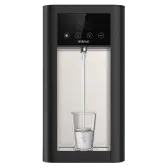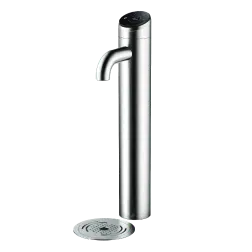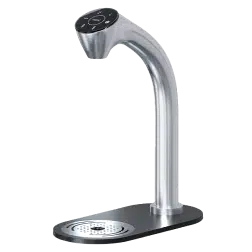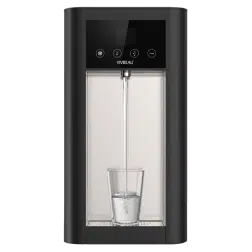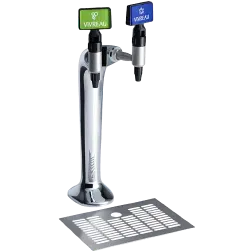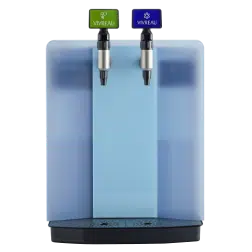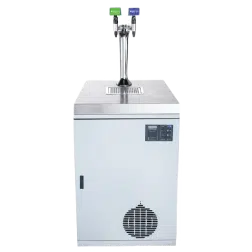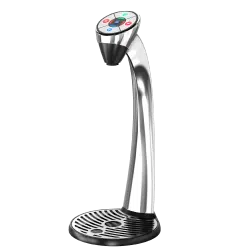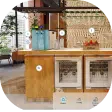Article originally published by QSR Magazine
Water waste is a persistent global challenge that shows no signs of diminishing.
The World Resource Institute predicts that by 2050, an additional billion people will be living in arid areas and regions with high water stress, underscoring the growing importance of water conservation. Restaurants are notorious for waste. Over 20 percent of agricultural water resources are lost due to food waste, shedding light on the opportunity for restaurants to play a big role in reducing water waste within their operations.
Given the high levels of waste in the restaurant industry, finding water conservation measures for these establishments is crucial. According to the United States Environmental Protection Agency, water used in hospitality and food service establishments constitutes about 15 percent of total water use in commercial and institutional settings. The same study found that water costs have increased significantly over the past decade, adding financial strain on top of the environmental impact of water waste. With costs increasing, water waste reduction is not only an environmentally conscious decision, but a fiscally responsible decision as well.
Reducing water waste in restaurants
The restaurant industry stands at a pivotal moment where it can significantly contribute to global sustainability efforts. As consumer preferences continue to evolve, those in the sector that adapt to meet these expectations will ensure their operations not only survive but thrive in an eco-conscious world. Outlined below are a few ways restaurants can be more sustainable.
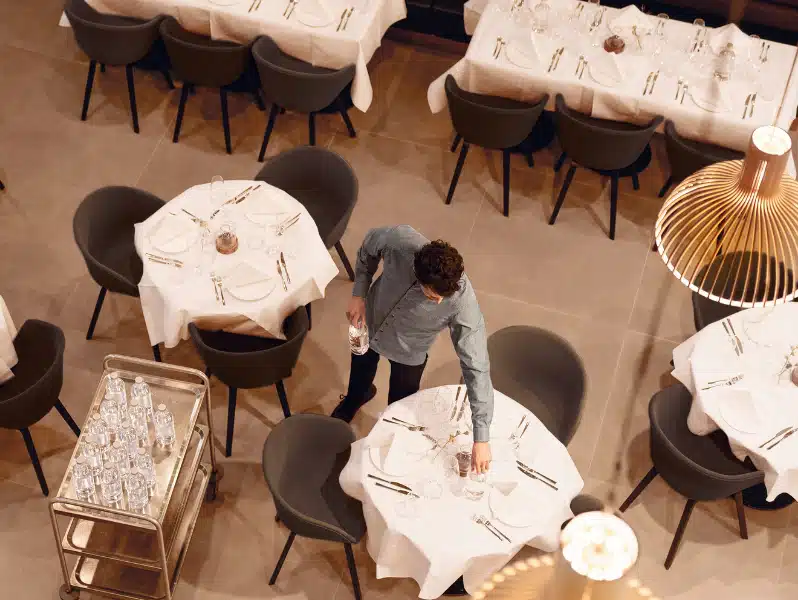
1. Water Service
For restaurants selling plastic water bottles, providing reusable water bottles or cups to customers serves as a significant step forwards in sustainability efforts. Allowing customers or cashiers to access water primarily through refill stations located throughout the restaurant is an effective way to promote sustainable practices. This approach not only reduces waste but also offers convenience to customers, who can drink as much water as they please, instead of being limited to a pre-packaged amount.
2. Run an efficient kitchen
Sometimes the best measures a restaurant can take is improving from within. Upgrading dishwashers, ice machines, and steam cookers can significantly reduce water usage. Maximizing the efficiency of pre-rinse spray valves, food disposal systems, and boiler-reliant equipment such as combination ovens, steam kettles, and steam cookers also contributes to water conservation. Replacing continuously discharging equipment, like dipper wells or wok stoves, with efficient models or turning them off when not in use can also save substantial amounts of water.
Restaurants can also take stock of their water dispensers to optimize water usage. Water dispensers that offer both still and sparkling water are a great way to minimize the need for single use plastic bottles while delivering the same overall customer experience. Even when a dispenser reaches the end of its cycle, restaurateurs can responsibly recycle them by removing the refrigeration gasses and stripping them down to separate plastics and metals for recycling.
3. General Building Maintenance
Even more can be done internally to help conserve water in different ways. Things like comparing monthly water meters readings year over year can help identify leaks and monitor conservation efforts. Reducing excessive blowdown from air conditioners by following the manufacturer’s specifications can also save water. Implementing dry floor-cleaning methods followed by damp mopping when necessary conserves water is another effective water reduction strategy. Changing window cleaning schedules from “periodic” to “as required” further reduces water usage. All these methods may not be customer facing, but are great tactics in helping restaurants become more sustainable.
For restaurants selling plastic water bottles, providing reusable water bottles or cups to customers serves as a significant step forwards in sustainability efforts. Allowing customers or cashiers to access water primarily through refill stations located throughout the restaurant is an effective way to promote sustainable practices. This approach not only reduces waste but also offers convenience to customers, who can drink as much water as they please, instead of being limited to a pre-packaged amount.
The impact of sustainable practices in restaurants
Adopting sustainable practices benefits both the environment and a restaurant’s reputation and profitability. Customers are increasingly seeking out businesses that align with their values, and restaurants that prioritize sustainability can capture this growing market segment. Moreover, sustainable operations often lead to cost savings in water, energy, and waste management, creating a win-win scenario for both the environment and the bottom line.
Implementing a bottling system is one way restaurants can achieve this win-win scenario. For example, restaurants in Quebec and Boston installed bottling systems as sustainable water programs for their dining areas seeing results that were both profitable and sustainable. The Boston restaurant saved $7,000 a year and eliminated the use of over 10,000 water bottles while the Quebec restaurant saved 60,000 single-use plastic bottles and reduced the need for over 60 truck deliveries. By eliminating plastic water bottles and installing a system that allows seamless access to water, these restaurants not only enhanced their sustainability but also reaped significant financial benefits.
Looking to the future of sustainability in the restaurant industry
By embracing water conservation, energy efficiency, waste reduction, and guest engagement, restaurants can lead the charge toward a more sustainable future. Continued innovation and commitment to sustainable practices will be crucial in shaping a resilient and environmentally friendly restaurant industry.
